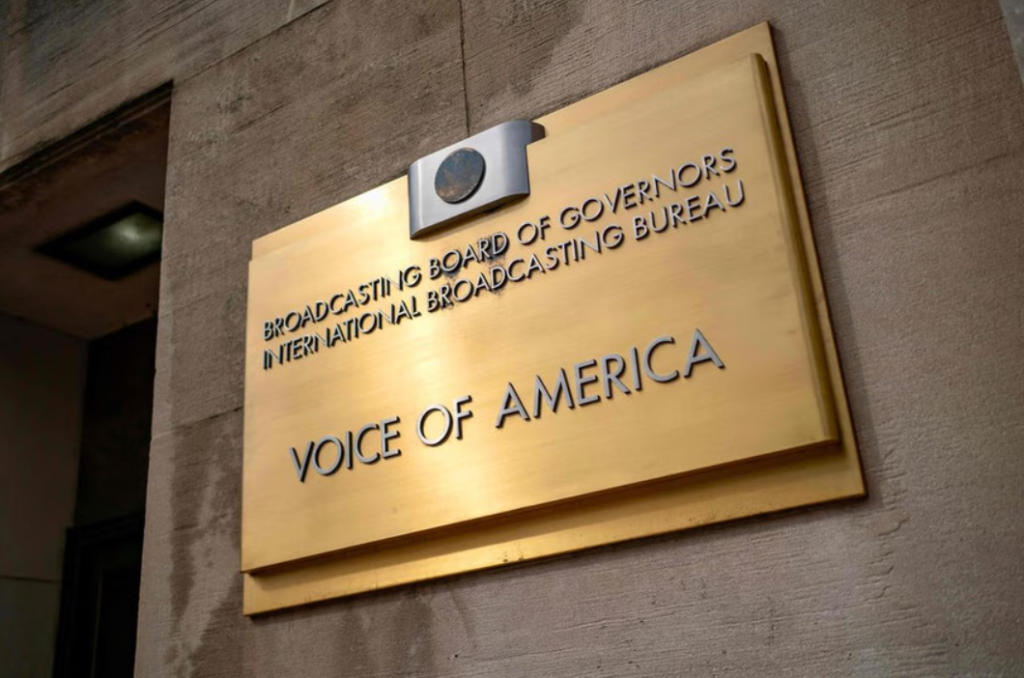Washington, D.C. – The recent budget cuts to Voice of America (VOA) and Radio Free Asia (RFA) by the U.S. government have sparked mixed reactions globally, with Chinese state media celebrating the move as a setback for U.S.-funded independent journalism. The funding reductions, part of a broader government spending cut, have forced these agencies to place hundreds of employees on administrative leave, significantly impacting their operations.
Chinese Government Responds to Budget Cuts
At a press briefing on March 18, Chinese Foreign Ministry spokeswoman Mao Ning declined to comment on the specifics of the cuts. Still, she took the opportunity to criticize VOA and RFA, stating that their reporting on China-related issues had been biased and misleading.
“Their poor reporting on China issues has long been evident,” Mao remarked, a sentiment echoed by China’s state-run media, which hailed the cuts as a blow to U.S. influence in the region.
The editorial added that the outlet had backed rioters involved in the 2019-2020 Hong Kong protests, as well as separatists in Taiwan, which China considers to be a part of its territory. It further accused the VOA of “playing a key role behind nearly every malicious and absurd anti-China falsehood”.
Mr Hu Xijin, former Global Times editor-in-chief, called the “paralysis” of the likes of VOA and RFA “gratifying” in a March 16 social media post.
READ MORE: Voice of America (VOA) face major budget cuts as US slashes government media funding
In the post, he recounted his experience on a VOA program a decade ago and said that he was denied the chance to rebut points made by an anti-China scholar then.
Mr Hu, who has 24.9 million followers on the popular microblogging platform Weibo, said: “The VOA hosts were aggressive, and would cut me off whenever I tried to elaborate on my points.”
He said: “This is how the VOA fakes objectivity… and I believe that the Chinese people are pleased to see the collapse of America’s anti-China ideological strongholds from within.”
A Straits Times search on March 18 of “VOA” and “RFA” on Weibo, a gauge of public interest on current affairs, yielded zero results – a sign that discussions on the two titles have been censored.
Impact on VOA and RFA Employees
The budget slashes, ordered under former President Donald Trump, have had severe consequences for both organizations:
Voice of America (VOA): The funding cuts have led to nearly 1,300 staff members being placed on administrative leave, affecting journalists, producers, and editorial staff worldwide.
Radio Free Asia (RFA): Although operating on a smaller scale, RFA has also seen significant layoffs, with several dozen employees losing their positions.
VOA Chairman Speaks Out
In response to the cuts, VOA Chairman Michael Abramowitz condemned the decision, calling it a serious blow to press freedom. “For the first time in 83 years, the storied Voice of America is being silenced,” he said. “This is not just about jobs; it’s about the ability to provide factual, independent news to audiences in countries where free press is under threat.”
A Victory for Authoritarian Regimes?
VOA and RFA have historically played a crucial role in countering state-controlled narratives in China, Russia, and other authoritarian regimes. With these cuts, analysts warn that U.S. influence in global information warfare may weaken, giving authoritarian governments more control over public discourse.
As the debate over government spending continues, many fear these cuts will leave millions of people without access to unbiased news, making them more vulnerable to state propaganda.



7 Comments
Honestly, I’m obsessed with these CBD gummies like legal thc gummies ! I’ve tried a lot of brands, but these are legit the best. I go off visit united after a protracted daytime and it ethical helps me influenza exposed and a halt overthinking everything.
They touch like actual sweets no odd grassy flavor at all. My drop has been fail elevate surpass since I started enchanting them, too. If you’re on the tergiversate, exactly get them! They’re a total lifesaver on the side of my routine stress.
I’ve been using cbd infused products regular on account of during the course of a month at the moment, and I’m truly impressed at near the sure effects. They’ve helped me judge calmer, more balanced, and less solicitous throughout the day. My saw wood is deeper, I wake up refreshed, and straight my pinpoint has improved. The value is outstanding, and I cognizant the common ingredients. I’ll positively keep buying and recommending them to the whole world I be aware!
I have been surfing online greater than three hours nowadays, but I by no means found any fascinating article like yours. It¦s lovely worth enough for me. Personally, if all webmasters and bloggers made good content material as you did, the web can be a lot more helpful than ever before.
Excellent post. I was checking continuously this blog and I am impressed! Extremely helpful information specially the last part 🙂 I care for such info much. I was seeking this certain information for a long time. Thank you and good luck.
Hello would you mind sharing which blog platform you’re using? I’m planning to start my own blog soon but I’m having a tough time deciding between BlogEngine/Wordpress/B2evolution and Drupal. The reason I ask is because your design and style seems different then most blogs and I’m looking for something unique. P.S Sorry for getting off-topic but I had to ask!
When I originally commented I clicked the “Notify me when new comments are added” checkbox and now each time a comment is added I get four emails with the same comment. Is there any way you can remove people from that service? Cheers!
Hello, i believe that i noticed you visited my weblog so i came to “go back the desire”.I am trying to find things to improve my web site!I suppose its ok to make use of a few of your ideas!!